Editing Time Axes with the Chart Properties Form for OnePager Express for Version 7.0
Contents
- 1 Overview
- 2 Chart Properties Form Time Axis Tab’s Calendar Sub-Tab
- 3 Chart Properties Form Time Axis Tab’s Three Level Sub-Tabs
- 3.1 Show This Level Control
- 3.2 Re-Order Levels Controls
- 3.3 Labels Control Group
- 3.4 Formatting Control Group
- 3.5 Time Axis Level Sub-Tabs and the Floating Time Axis
- 4 Chart Properties Form Time Axis Tab’s Format Sub-Tab
- 5 Related Links
Overview
This article covers the Global editing of the Time Axis. As with all global editing, the OnePager Express' Template Properties and Chart Properties form play import roles in providing you with precise control over the properties of Time Axis Levels and Floating Time Axis Levels. As mentioned elsewhere with respect to OnePager Express’s Time Axis feature, the Template Properties form’s Time Axis tab is almost identical to the same tab in the Chart Properties form. This article covers the global editing capabilities available in the Chart Properties form.
For more information on the Template Properties form’s Time Axis tab, please see this section in the article at: Template Only Features-OnePager Express – Template Properties Form's Time Axis Tab
The Time Axis tab of the Chart Properties form (See the illustration below) provides the settings for both Time Axis Level and Floating Time Axis Level editing. The Chart Properties form at the Time Axis tab has five (5) sub-tabs, three (3) of which have almost identical controls. Regardless, you have a great deal of control over the characteristics and appearance of the Time Axis. The Template Properties form’s Time Axis tab is similarly constructed.
Other articles related to the Time Axis are referenced from this article so as not to repeat descriptions and examples here. This article uses Wiki internal links to provide you with access to more detailed articles covering the use and operation of Chart Properties form Time Axis tab and sub-tab controls
Chart Properties Form Time Axis Tab’s Calendar Sub-Tab
The new Calendar sub-tab, previously called the Advanced sub-tab, is shown below:

Date Boundaries Control Group
On this renamed sub-tab, the Date Boundaries group, consisting of the chart’s Start Date and Finish Date boundaries are taken from the controls that are previously found on the Chart Properties form’s Main tab.

There are also new controls on the OnePager View ribbon tool bar tab that make it quite easy to edit the Start Date and Finish Date boundaries for the chart as shown here:

For more information on the Date Boundary controls, please see this section in the article at: Editing the Chart’s Start/Finish Date Boundaries
Also moved from the Chart Properties form’s Advance tab is the Auto-adjust timeline control as shown below with its dropdown list of options:

For more information on the Auto-Adjust Timeline Options controls, please see this section in the article at: Auto-Adjust Timeline Options in the Chart Properties Form
Calendar Setting Control Group
The Calendar Settings group of controls was previously accessed from the Chart Properties form’s Main tab through the Configure time axis button and the Advanced sub-tab of the Advanced time-axis features form in previous OnePager versions. As it functioned previously, this control group allows you to specify fiscal year parameters for all Time Axes.

The controls in this group relate to the use of Fiscal Year/Week designation, specifying the First day of the week, and the First week of the Year.
For more information on the Fiscal Year and Weeks controls, please see the article at: Using Fiscal Years and Weeks for OnePager Express
Additionally, the Calendar Settings control group is used for creating Count Up/Down sequences any Time Axis Level.

With OnePager you can create Count Up/Down sequences on all three Time Axis Levels.
For more information on Creating Count Up and Down Time Axis sequences, please see the article at: Creating Count Up and Down on the Time Axis for OnePager Express
Formatting & Layout Control Group
The Formatting & Layout control group provides the checkbox for multi-page outputs of Time Axis Level visualizations on all output pages. Additionally, the management of Custom Date Formats, and the location of the Time Axes with respect to the top and bottom of the Graph are provided here.
For more information on these subjects, please see the articles at:
| Creating Multi-Page Charts (Portal) |
| The Custom Date Format Feature for OnePager Express |
Time Axis Location(s) Sub-Control Group
The Time Axis Location(s) sub-group controls were moved from the Chart Properties form’s Main tab to the Chart Properties form Time Axis tab as shown below.
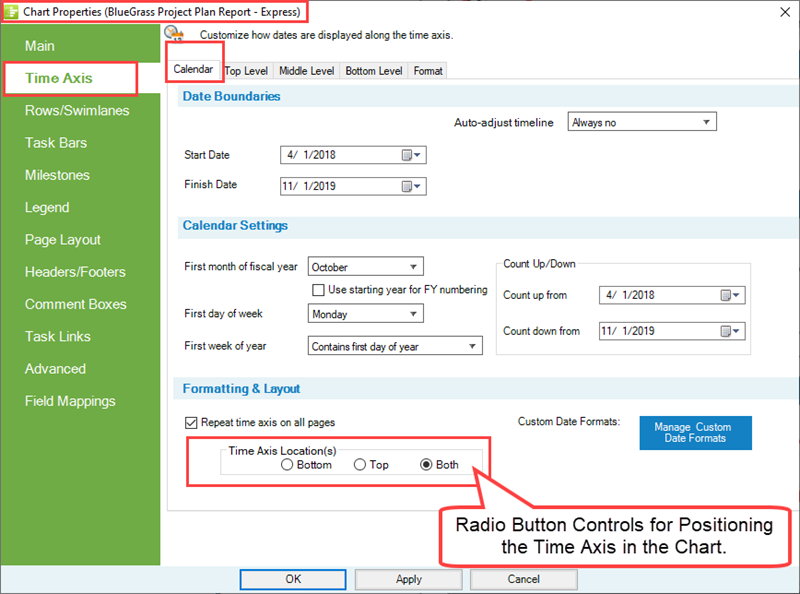
As with previous versions of OnePager you have the option to display up to three Time Axis Levels at the Top of the Graph, the Bottom of the Graph, or at Both locations as shown in the illustration below that also includes a three level Floating Time Axis:
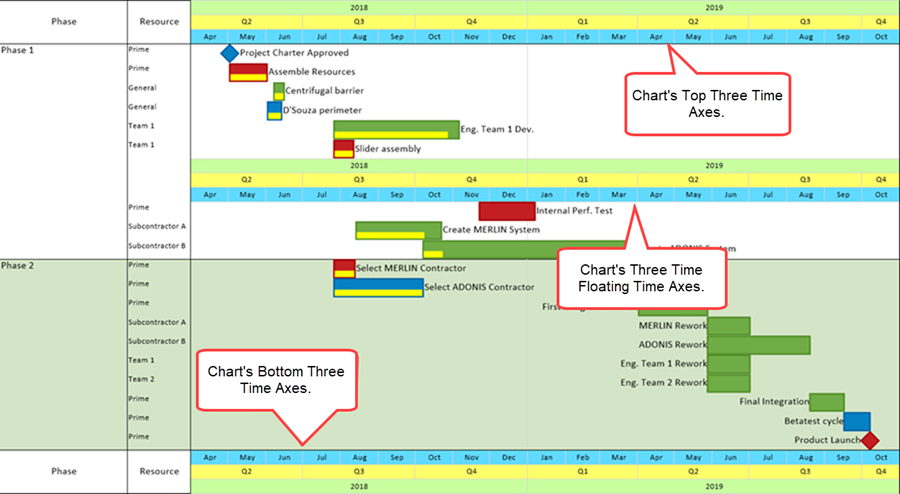
Custom Date Format Control Sub-Group
You also have controls for the new feature for creating and editing Custom Date Formats by using the form accessed by clicking the Manage Custom Date Formats… button as shown here:
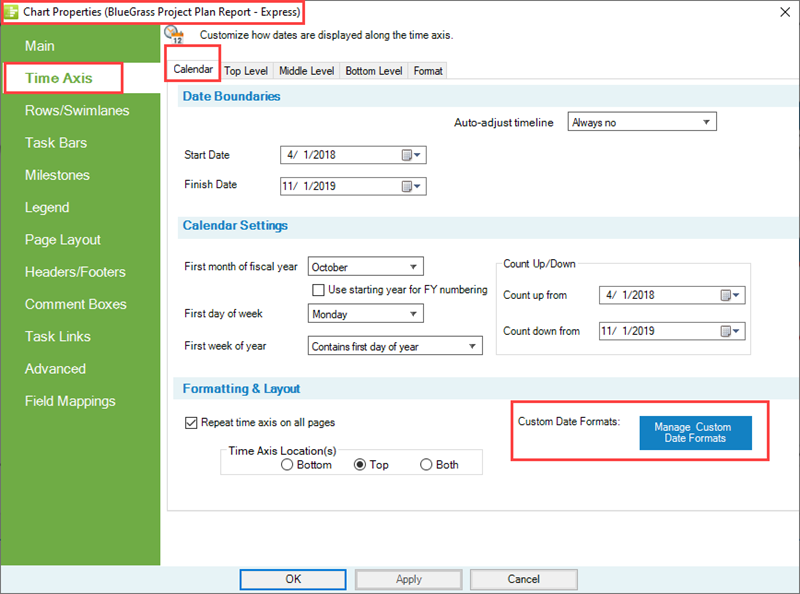
When this button is clicked, the Add Custom-Date Format form is accessed as shown below:
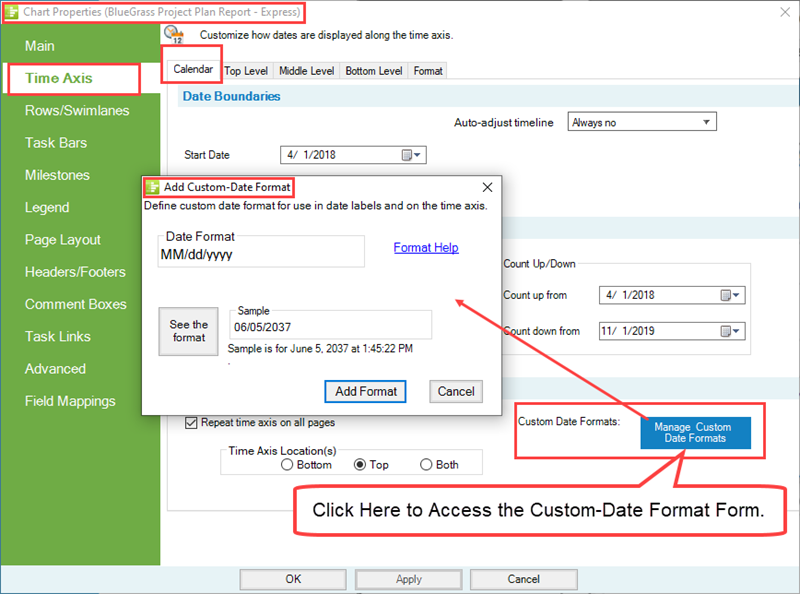
This form allows you to add Custom Date Formats by creating them in the Date Format window shown in the form above. Defining your own Custom Date Formats can be useful when you want the text displayed in various Time Axis and Floating Time Axis Levels for specific meaning beyond what OnePager provides.
For more information on creating and editing Custom Date Formats please see the articles at: The Custom Date Format Feature for OnePager Express
Chart Properties Form Time Axis Tab’s Three Level Sub-Tabs
The new Chart Properties form’s Time Axis tab has three (3) Time Axis Level sub-tabs. The Time Axis tab’s Middle Level sub-tab looks like this:

The Top Level and Bottom Level sub-tabs are similar and function in the same way.
Show This Level Control
The Show this level checkbox is, as the default setting, checked for each Time Axis Level in the three Level sub-tabs. Unchecking this checkbox OFF hides the corresponding Time Axis Level at the location or locations specified in the Calendar sub-tab’s Formatting & Layout group’s Time-axis Location(s) control. At least one Time Axis Level’s Show this level checkbox must be checked. OnePager provides a warning if an attempt is made to uncheck all Show this level checkboxes as shown here.

Re-Order Levels Controls
The three Level sub-tabs, Top Level, Middle Level, and Bottom Level, correspond in function to the same sub-tabs in previous OnePager versions. The OnePager Top Level, Middle Level, and Bottom Level tabs have all the same controls. Each sub-tab also has one or two Up/Down arrow buttons labeled Re-Order Levels. Within any of the three Time Axis Level sub-tabs, you can re-order the Level’s position in the Time Axis portion of the chart to a higher or lower Level and with it the settings associated with the Level being re-positioned.
Re-Order Levels - An Example
For example, suppose you have a standard looking chart with three Time Axis Levels organized as Years on the Top level, Quarters in the Middle level, and Months in the Bottom level as shown below:

Using the Chart Properties form’s Time Axis tab at the Middle Level sub-tab you can re-order the Top Level with the Middle Level as illustrated below:
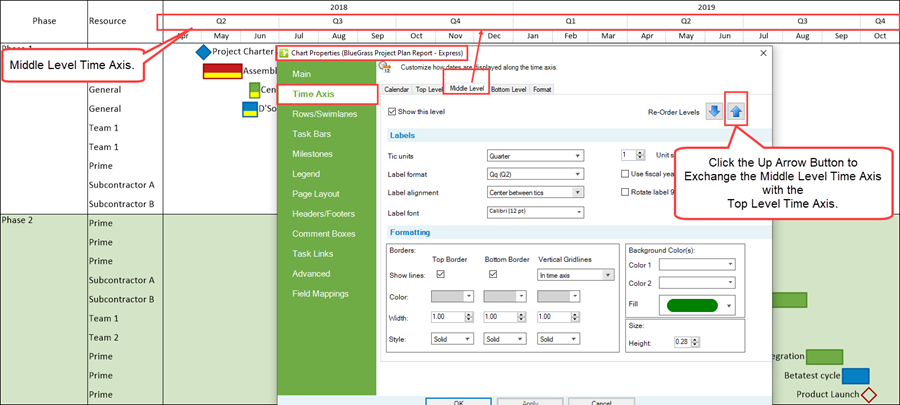
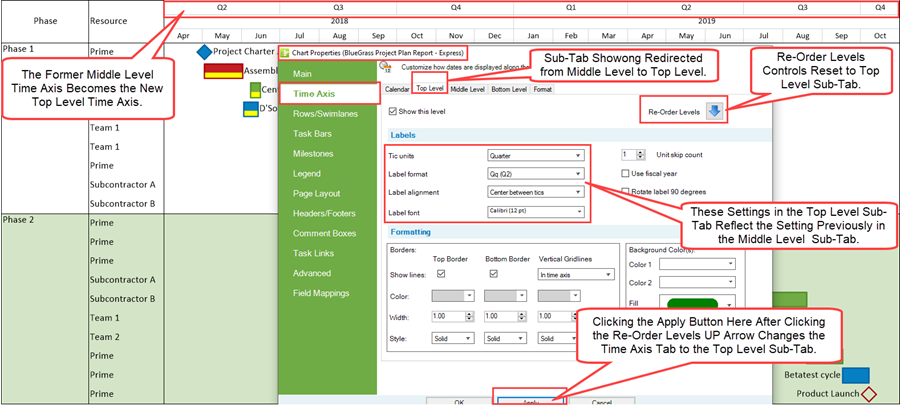
The Show this level checkbox and the Re-Order Levels controls are useful in making the Time Axis visualizations support your specific schedule conversation needs.
For more information on the Re-Order Levels control, please see the article at: Switching Time Axis Levels for OnePager Express
Labels Control Group
16) Within each sub-tab are controls for Time Axis Level Labels as in previous OnePager versions.

Tic Unit Control
The Tic units dropdown for each Time Axis Level consist of the same options as shown below:

For more information on Time Axis Level Label controls, please see the article at: Labeling Time Axis Levels for OnePager Express
Label Format Control
The Label format dropdown is enhanced to give you the capability to define your own Custom Date Format as discussed in more detail below.
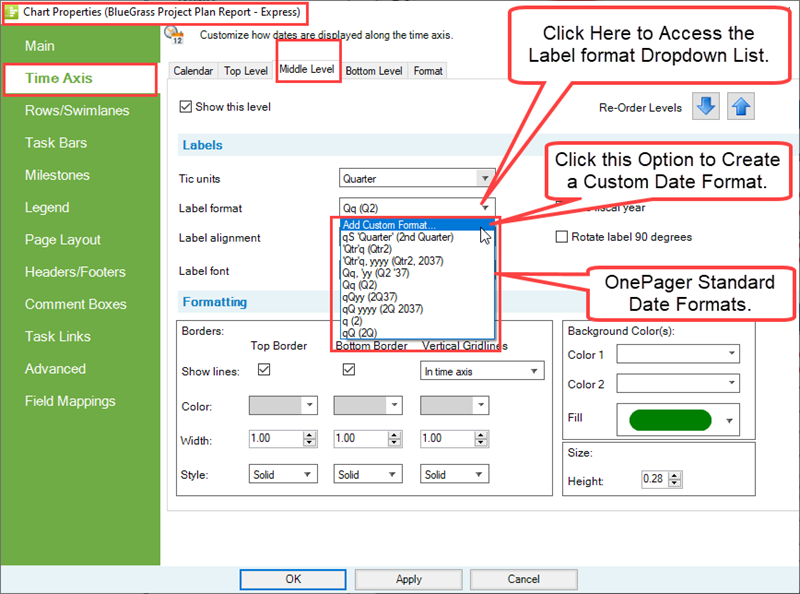
Unit Skip Count Controls
The Unit skip count determines the number of time units that are skipped between Time Axis Level Labels. Normally the Unit skip count is set to 1 as shown below:

Unit Skip Count - An Example
To illustrate an, if you set the Middle Time Axis Level’s Unit skip count to a higher value of 2, the Time Axis Middle Level looks like this:

In the above illustration the Middle Level Time Axis is no longer consistent with the Top or Bottom Level Time Axes with respect to Unit skip counts. To avoid confusion, it is recommended not showing the Bottom Level Time Axis as illustrated below:

Use Fiscal Year Control
The Use fiscal year checkbox, when checked, tells OnePager to apply Fiscal Year/Week dates as applicable. The controls for Fiscal Year/Week designations are found in the Chart Properties form Time Axis tab’s Calendar sub-tab in the Calendar Settings group as discussed above.
For more information on formulating Fiscal Year Time Axis Levels, please see the article at: Using Fiscal Years and Weeks for OnePager Express
Rotate Label 90 Degrees Control
The Rotate label 90 degrees checkbox found in the Top, Middle, and Bottom Levels sub-tabs of the Chart Properties form’s Time Axis tab allows you to represent the various Time Axis Level Cell’s text contents rotated 90 degrees clockwise as shown below:

Formatting Control Group
For each of the three Time Axis Levels there are individual Formatting control groups and sub-groups as shown here:

Top and Bottom Borders Sub-Group Controls
The Borders sub-group has controls for the Top border and Bottom border for each of the three Time Axis Levels with:
Show Lines
Show lines: checkboxes that turn the Border visualizations ON and OFF,
Color:
A Color: dropdown accesses the OnePager standard Color Chooser form for selecting the Border’s color,
Border Width:
A Border Width selector, measured in inches or centimeters depending on the type of Template Properties form, provides the means for setting the thickness of the border line you selected.
Border Dash Types
The Border Dash types options selector provides yu access to four (4) different representations of the border including (1) Solid, (2) Dash, (3) Dash-dot, and (4) Dash-dot-dot.
Vertical Gridlines
The Vertical Gridlines dropdown provides options for specifying how far the vertical gridlines extend through the Time Axis Levels and into the graph. There is a separate Vertical Gridlines dropdown set of options for each Time Axis Level. The three Vertical Gridline options available for each Time Axis Level include: (1) In time axis, (2) In graph, and (3) In the chart & graph. In addition to the type of vertical gridline that can be selected, you can also choose the color of the vertical gridline, its width, and the vertical gridline's dash type.
The In Time Axis Option
Selecting the In time axis option places a vertical gridline only in the selected Time Axis Level using the color, width, and dash-type selected for the particular Time Axis Level.
The In Chart Option
Selecting the In chart option places the vertical gridline only in the chart vertically down along the vertical borders of the Time Axis Level selected. For example, if the Top Time Axis Level is selected, OnePager places a vertical gridline into the chart on the end borders of each Year, as an illustration. If you subsequently decide to place a vertical gridline of a different color. width, or dash type using the Middle Time Axis Level controls, say, for Quarters, the vertical gridlines for both the Top and Middle Time Axis Levels overlap at the right side of Quarter 4 Middle Level Time Axis vertical boundaries as these two Time Axis Level's vertical boundaries are shared. When attempting to use vertical gridlines in the chart for multiple Time Axis Level care should be exercised to assure that the results OnePager provides meet your expectations. Because these controls and this option in particular are found in each Time Axis Level, we recommend utilizing only one Time Axis Level to insert vertical gridlines in the chart to meet your specific needs.
The In Chart & Time Axis Option
Selecting the In chart & time axis option places the vertical gridline in both the selected Time Axis Level and the graph. The in chart & time axis option operates as described above for the in chat option where you may encounter overlapping vertical gridlines introduced when multiple Time Axis Levels have implemented vertical gridlines.
Avoiding Conflicts between Vertical Gridline Selections
It is recommended that you think through how you want Vertical Gridlines to appear in the chart and in the Time Axis Levels before making option settings. For best results, we recommend that you select only one Time Axis Level for implementing the In chart option of vertical gridlines. Subsequently, you can make appropriate selections in this control group for both horizontal border and vertical gridline settings after the vertical gridline in the chart is established.
Management of Adjacent Borders Between Time Axes
Adjacent Time Axis Level borders (i.e., above and below) overlap between the Top and Middle Time Axis Levels and between the Middle and Bottom Time Axis Levels. The Bottom Border of the Bottom Time Axis Level overlaps with the Inner Frame border of the chart. The Top Border of the Top Time Line Axis Level overlaps with the Outer Frame border of the chart. Any Border Color selected for a Top or Bottom Border can therefore conflict with its adjacent Time Axis Level border, Inner Frame border, or Outer Frame border. As a general rule, Time Axis Level Border settings take priority over Inner and Outer Frame border color settings when you are editing the default colors for both Time Axis Level borders and Inner and Outer Frame borders.
For more information on the controls in the Borders sub-control group, please see the article at: Changing the Time Axis Borders for OnePager Express
Time Axis Level Background Color(s): Sub-Group
To the right of the Borders control sub-group is the Background Color control sub-group that provides the capability to create alternating Background Colors within a Time Axis level and a dropdown control for selecting Fill patterns. The Color 1 and Color 2 control dropdowns access the One Pager standard Color Chooser form. Color 1 and Color 2 can be selected as the same color to produce a uniform Background Color for the selected Time Axis Level or they can be different colors to give the alternating Background Color effect as illustrated below for the Middle Level Time Axis:

Finally, there is a dropdown selector for choosing one of the five Fill patterns as shown here:

Fill Pattern selection applies to the entire set of Time Axis Level Cells. Individual Time Axis Level Cells cannot be mavericked with respect to Fill Pattern.
For more information on the controls in the Background Color(s): sub-control group, please see the article at: Changing the Time Axis Background Color and Fill Pattern for OnePager Express
Time Axis Level Size (Vertical Height): Control Group
The Size: control sub-group allows you to set a standard Height for all Cells in each Time Axis Level in either English or Metric units depending on the type of Template being used to create the chart as shown here in inches:

Increasing the Height: value makes the Time Axis Level higher as shown here where the Height: value is increased to 0.53 inches with this Template Properties form:

For more information on selecting English versus Metric Units, please see the article at: Managing the Current Template
Time Axis Level Sub-Tabs and the Floating Time Axis
As mentioned earlier, most edits made in either the Top, Middle, and/or Bottom Time Axis Level sub-tab in the Chart Properties form’s Time Axis tab that are applied to a Time Axis Level are also applied to the corresponding Floating Time Axis Levels. The exception to the above statement is the Height: control in the Time Axis Level sub-tabs. Using the Chart Properties form’s Time Axis Level sub-tab’s Size control sub-group does NOT allow you to change the Height of the Floating Time Axis Level.
For more information on the Floating Time Axis feature, please see the article at: The Floating Time Axis Feature for OnePager Express
For more information on the controls in the Formatting control group, please see the article at: Changing the Time Axis Borders for OnePager Express
Chart Properties Form Time Axis Tab’s Format Sub-Tab
The Format Sub-Tab
The Format sub-tab has two main control groups and associated sub-groups of controls for managing Daily Curtains, representing Working and Non-Working Hours, and managing Timespans as shown below:

Above the Days of the Week and Non-Working Times control group there are five (5) control sub-groups some of which have multiple checkboxes and selection dropdown controls to access the standard Color Chooser. The Curtains and Timespans control group has a "Grid", empty in the illustration above, that has multiple uses including maintaining a record of all Curtains and Timespans, adding new Curtains and editing Timespans in the chart, and editing the properties of Curtain and Timespan entries in The Grid.
The Days of the Week and Working Times Control Group
The Format Days of the Week & Working Times control group gives you precise controls to specify the showing or hiding of Daily Curtains, their color, their transparency value, and the color of their borders in the Graph.
Days of the Week Formatting Options
The default values for the Show Days: checkboxes is checked ON. Unchecking any day in the Show Days: set of checkboxes to OFF causes that day to be hidden throughout the chart.
Caution on Unchecking the Show Days Checkboxes
Unchecking several Show Days checkboxes to OFF in a chart with a long timeline, say, greater than a year can drastically decrease the width of the chart in the Chart Editor. Unchecking all Show Days: checkboxes to OFF prompts an error message as shown below because at least one day of the week must be shown:

However, Daily Curtains are not shown for checked Show Days: checkboxes unless a non-No Fill color is selected in one or more of the Daily Curtain Colors: Color Chooser dropdowns.
Setting Daily Curtain Transparency and Border Colors
There are sub-group controls in the Format Days of the Week and Working Times control group that deal with globally setting the transparency and border colors for Daily Curtains as shown below:

The Working Hours Control Sub-Group
OnePager supports the visualization of Working Hours and Non-Working Hours. For charts that require granularity on the Time Axis down to the hour level it is possible to explicitly show Non-Working Hours using these controls. The controls for Non-Working Hour visualization require that Working Hours be defined to OnePager. The controls for this are provided in the Chart Properties form Time Axis tab’s Format sub-tab as shown here:

Defining Working Hours
Clicking the Define Working Hours… button accesses the Set Working Times form shown below:

The form above is shown with Monday through Friday pre-selected so that the pre-defined Work Time Start and Work Time End settings are show in the Set working times for selected day(s): window. You can select more than one day of the week and have your entries in the adjacent window apply to all these days. You can also establish different working times for different days of the week. Within any selected day you are able to enter more than one set of Work Time Start and Work Time End sets. This is particularly useful when there are multiple shift work schedules.
Clicking the Add button below the window places a blank entry where you can use the Time Selector dropdowns to make time of day selections. The Time Selector dropdown list provides time of day selections at 15 minute intervals beginning at 12:00 AM (00:00 hours for 24 hour representations) and ending at midnight (24:00 hour for 24 hour representations).
The Delete button removes a selected entry from the window.
Instructions are provided in the area below the Add and Delete buttons. As mentioned above, you have the option with the Time format: control to select between 24 Hour and 12 Hour representations of time in the Set working times for selected day(s): window. When all entries are made, click the OK button to complete the definition and the Apply or OK button on the Chart Properties form to apply the formats to the chart.
Showing Non-Working Hour Curtains - An Example
To better Illustrate the results when entering a color for Non-Working Times, the chart below is configured to show a two consecutive working day periods. The Middle Level Time Axis is edited to show Days and the Bottom Level Time Axis is edited to show Hours:

Going to the Chart Properties form Time Axis tab at the Format sub-tab’s Working Hours: sub-group controls, you can make sure that the Show Non-Working Hours checkbox is checked and select a color from the OnePager standard Color Chooser form to represent Non-Working Hours as shown here:

When the Apply or OK button is clicked on the Chart Properties form, the chart looks like this:

Caution with Show Non-Working Hours
If you attempt to Show Non-Working Hours in a chart that has a long timeline, say over a few weeks or months or longer, the process of creating the Non-Working Hour Curtains can take a while and the resulting graphic representation of the Non-Working Hour Curtains can all blend together.
For more detailed information on control in the Days of the Week and Non-Working Times control group, please see the article at: Managing Working Hours and Non-Working Hours for OnePager Express
Using the Curtains and Timespans Grid (The Grid)
The Curtains and Timespans Grid or The Grid has multiple purposes and supports your management of Curtains as well as the management of Non-Linear Time Axis Level Cells called Timespans. Although the discussions which follow provided some depth into how OnePager uses The Grid and how you can use The Grid to configure your charts and snapshots, the table below provides links to more complete and in depth treatment of The Grid:
| The Non-Linear Time Axis Feature for OnePager Express |
| The Floating Time Axis Feature for OnePager Express |
| Creating, Editing, and Managing Time Axis Daily Curtains for OnePager Express |
Managing Curtains in The Grid
The Grid provides Curtain entries to track most Curtains such as those Curtains created from:
- 1) Clicking the Insert Curtain button on the OnePager Express Insert ribbon tool bar tab.
- 2) Curtains created by clicking the Insert curtain command in the time axis right-click context menu accessed by right-clicking any Time Axis Level individual Cell.
Daily Curtains and Curtains representing Non-Working Times are not recorded in The Grid and cannot be edited in the Grid.
A chart with a Curtain inserted from the OnePager Express Insert ribbon tool bar tab and two Curtains inserted from two Time Axis Level Cells is shown below with their The Grid entries:

For more information on the managing Curtains in The Grid, please see the article at: Creating, Editing, and Managing Time Axis Daily Curtains for OnePager Express
Managing Timespans in The Grid
The Grid also provides a place for the management of Non-Linear Time Axis Level Cells called Timespans. Timespans are created whenever you manually stretch or compress a Time Axis Level Cell. When you do this, a Timespans entry is created in The Grid as shown below:

There eight (8) columns in The Grid that apply to Timespan entries out of the total of ten (10) columns.
Where a column is disabled, the column cannot be selected or edited as the column does not apply to the Timespan entry.
The left most column is the Selection column which highlights the entire selected entry and allows you to use the entry with the Add Timespan, Copy Timespan, and Delete Timespan buttons shown below The Grid. You can edit any cell in The Grid if it is enabled by clicking on it. The Type column above shows that all entries are Timespans. The Type displays the word Timespan when the entry is a Timespan entry and all non-disabled cells in the entry are enabled. The On checkbox is checked when the Timespan entry is appears as a stretched or compressed Time Axis Level Cell and unchecked when you want the Timespan appears in its unstretched width.
The From Date and To Date columns specify the range of the Timespans and can be edited using the Date/Time Picker accessed by left-clicking on the entry’s From/To Date cell as was illustrated above for Curtain type entries. By checking the Format with times checkbox in the Chart Properties form Advance tab’s Display options control group, it is possible to specify From/To Dates down to hours and minutes.
For more information on the Format with times checkbox, please see the the article at: Advanced Tab for OnePager Express
The Show checkbox is checked ON when you want the Timespans to be shown and unchecked when you want to hide the selected Timespan. Unchecking the Show checkbox hides the Timespan and changes the look of the chart. Hiding the Timespan does not remove the Timespan entry from The Grid.
The Zoom% is specifically for controlling the width of a Timespan from The Grid. When Time Axis Levels are created in a new chart, their Cell’s initial widths are calculated based upon the length of the timeline and the width of the Graph. That calculation for each Time Axis Level Cell becomes the 100% value basis for the Zoom%.
For more information on managing Timespans in The Grid, please see the article at: The Non-Linear Time Axis Feature for OnePager Express
The Priority Column for Timespan Entries in The Grid
The Priority column in The Grid only applies to Timespan entries. It is used to keep track of the order that Timespans are manually stretched or compressed. The Priority column helps OnePager perform the Unstretch all cells command in the proper order. For all intent and purposes the Priority column is for your information.
Manually Inserted Timespan Entries in The Grid - An Example
In the illustration below, the third Timespan entry in The Grid was manually created joining the two previous Timespan entries inserted by manually stretching two Time Axis Level Cells:

Note in the above illustration that the third entry overlaps the stretched linear space of 2018 Quarter 4 since October and November 2018 was manually stretched previously and again by the effect of the third entry created.
This highlights the need for the Priority value to assist OnePager manage these Timespans. Having overlapping manually created Timespan entries allows you to hide a portion of a Time Axis Level Cell rather than the entire Cell.
Suppose you want to hide the Timespan in the third Grid entry shown above and repeated in the illustration below:

When you uncheck the Show checkbox to OFF for the third Timespan entry above, the portion of June and July 2019 covered by this third Timespan entry is hidden and looks like this:

When the Show checkbox for the third Timespan entry is unchecked, the portion of June and July 2019 are hidden and so are the corresponding vertical timespans including task bars and milestone symbols. If you instead apply this technique to longer timespans like Quarters or Years instead of Months as in the illustration above, you can focus attention more toward other areas of the chart.
Using The Grid’s Column Headers to Sort Entries
As with other Grids in OnePager Express, you are able to use the column headers to sort entries into ascending or descending order based on the column’s contents. As a rule, if a column in The Grid is disabled, it cannot be sorted.
Related Links
Template Only Features-OnePager Express
Showing Different Time Units of Time for OnePager Express
Changing the Chart’s Start/Finish Dates for OnePager Express
Using Fiscal Years and Weeks for OnePager Express
Creating Count Up and Down on the Time Axis for OnePager Express
Creating Multi-Page Charts (Portal)
The Custom Date Format Feature for OnePager Express
Modifying the Time Axis (Portal)
The Custom Date Format Feature for OnePager Express
Switching Time Axis Levels for OnePager Express
Labeling Time Axis Levels for OnePager Express
Changing the Time Axis Borders for OnePager Express
Changing the Time Axis Background Color and Fill Pattern for OnePager Express
The Floating Time Axis Feature for OnePager Express
Managing Working Hours and Non-Working Hours for OnePager Express
The Non-Linear Time Axis Feature for OnePager Express
Creating, Editing, and Managing Time Axis Daily Curtains for OnePager Express
Advanced Tab for OnePager Express
(22.4.2-70)